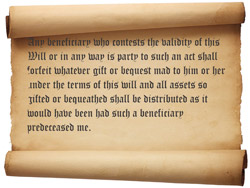Contesting a Will
When contesting a will it is crucial to consult with an attorney
as soon as possible!
There is a time limit within which to bring a claim against an estate and to issue a formal warning (caveat) to the court/executor before assets are being distributed.
This formal notice serves to halt proceedings - again for a limited time - until the person contesting the will can be heard.

Incidentally, even after probate has been granted a will can still be contested and declared invalid, but here too there are time limits.
Note: We provide a variety of free templates for family wills. You will find a list of links on our main Legal Wills page.
First Consideration When Contesting a Will - Was the Will Valid?
There are legal requirements for family wills and if there is evidence of one (or more) of the following, it will constitute primary grounds for contesting a will and the will may be declared invalid:

- It was not legally executed i.e. signed and witnessed according to requirements in the jurisdiction;
- The testator did not have the required testamentary capacity (e.g. suffered from dementia)or was unduly influenced or coerced when making his will;
- The will has been revoked or the will presented for probate is not the latest version;
- There is a condition in the will that cannot be fulfilled or the language is so vague that it is impracticable;
- There is evidence of fraud or the will has been forged;
- The testator lacked knowledge or understanding of the contents of the will or was not of legal age to make a will; and
- Contravention of a law e.g. in some jurisdictions the law specifically makes provision for a surviving spouse or children to retain possession of a family home!
We discuss the above in more detail here: What can make a will invalid?
The above list is by no means exhaustive due to the variations in legal requirements in countries, states or provinces!
If the will is declared invalid, an earlier will shall be favored. If no earlier will exists, the estate shall be dealt with according to intestacy law i.e. where a person died without a will (intestate).
Who Can Contest or Challenge a Will?
Only specific people are eligible to do so, such as:
- A surviving spouse or former spouse (who has not remarried) or a civil partner or cohabiting partner of long standing (specified in law)
- Biological children, step-children, legally adopted children
- A person financially dependent on the deceased
- Grand children, parents, siblings
Note: The above depends on your jurisdiction! For example, in some jurisdictions only step-children, grand children, parents or siblings who were dependent on the deceased or a member of the household of the deceased may contest or challenge a will.
Can Nephews or Nieces Contest a Will?
Nephews and nieces do not have an automatic right to inheritance or to contest a will unless:
- They were dependent on i.e. being supported by the deceased whether directly or indirectly, or they were cohabiting with the deceased;
- There were promises made to them by the deceased which they could enforce; and
- The will was not legally executed or invalid and in the case of no will they would inherit under the intestacy laws.
Sidebar: Apart from contesting a will or challenging the validity of a will, some persons may bring a claim (not talking about debtors here) against the estate. For example, a person who took care of the testator prior to his death and was promised a bequest but no provision for such a person was made in the will.
More Disputes About a Will - Contesting Executors, Delays in Probate and More

Apart from challenging the validity of a will, there may also be disputes about:
- The executors or trustees being removed
- The meaning and correct interpretation of a provision or clause
- Delays in probate
- The administration of the estate
The mention of trustees above may be particularly applicable when there is a Testamentary Trust and there is dissatisfaction about the manner in which the trust is being administered.
Is Accidental Disinheritance A Valid Reason to Contest a Will?
If you want to disinherit a child or spouse, you need to state that specifically in your will e.g. "I make no provision for my son Joe". Visit our page on Disinheritance for more information.
Simply NOT mentioning a child (or spouse) may be seen as an accidental error made by the testator and constitute grounds for contesting a will or bringing a claim against the estate.
The Burden of Proof is Firstly On the Claimant Contesting the Will
The first departure point of the court is to honor the wishes of a testator as expressed in a legally executed will - barring obvious evidence rendering a will invalid.
Within a prescribed period eligible persons can contest the validity of a will on grounds as previously discussed. The onus to prove invalidity rests upon the contesting claimant.
If the court accepts the challenge as having merit (i.e. there is doubt as to the validity of the will), the burden of proof then shifts to the parties who want the will to stand as is, to prove its validity.
How Much Does it Cost to Contest a Will

There are so many variables for a court to consider and every case is unique so the outcome is never certain!
Specialized legal advice must be sought and cases can drag on for a number of years, running up huge legal fees. Therefore the speedy resolution of claims is in the interest of all parties!
Consider Mediation Options and Consulting with a Contesting Wills Lawyer:
- There are law firms who will offer the first consultation at no cost to assess the merits of your case and who will work on a "No win no fee" (contingency) basis.
- Negotiate an agreement or seek mediation with the other beneficiaries.
- Make use of free or low cost legal resources to assess your claim such as a Citizens' Advice Bureau (CAB), Legal Aid or Community Legal Centres.
Requests for legal assistance at a reduced cost or for free are numerous, so there may be a long waiting list!
Below are some links which may be helpful:
Should You Add a No-Contest Clause - in terrorem clause - to Your Will?

This clause effectively states that a person forfeits an inheritance if such a person were to challenge the validity of your will.
The purpose is to terrorize (hence the term in terrorem) someone from contesting a will.
But if you left that person a small inheritance (or nothing) and he/she stood to gain a lot more if successful in contesting a will, then a no-contest clause will pose no threat and will not be effective.
The bequest needs to be of high enough value - however much that galls you - to make a potential claimant think twice before taking the risk to lose it should the claim not be successful.
Whether a no-contest clause will be enforced depends on the law of the land. However, the courts will look differently at wills that were made under undue influence or by someone lacking testamentary capacity (i.e. probable cause exists) and will not enforce the no-contest clause against a person seeking to overturn such a will.
Sample Wording of a No-Contest Clause in Your Last Will and Testament
"Any beneficiary who contests the validity of this Will or in any way is party to such an act shall forfeit whatever gift or bequest mad to him or her under the terms of this will and all assets so gifted or bequeathed shall be distributed as it would have been had such a beneficiary predeceased me."
The above is a very basic example. If you have a concern about someone who may challenge your will after your death, you need to consult with an attorney to assist with drafting your will to try and circumvent possible challenges!
An attorney specializing in estate law can assist you with a specifically drafted no-contest clause that identifies the person who may possibly challenge the will and also specify the assets they will lose if their challenge is unsuccessful.
Related Information Regarding Family Wills:
How to Create a Testamentary Trust in Family Wills
What is a Holographic Will and is it Legal?
Is an International Will Legal?
When can a person be disqualified from inheriting?
Consult with an attorney in your jurisdiction if you are unsure about any aspect regarding family wills!
You are here:
- Legal Documents »
- Writing a Will »
- Contesting a Will




